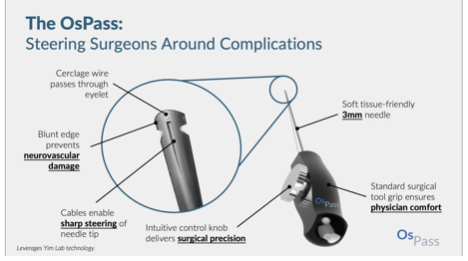The Y-Prize, a student startup competition based on technologies developed at Penn Engineering, is hosted by the Wharton School’s Mack Institute for Innovation Management, Penn Wharton Entrepreneurship and the Penn Center for Innovation each year. The team with the best pitch takes home $10,000 in investment funding.
This year’s winning team was Ossum Technologies, composed of Ananya Dewan, Hoang Le, Shiva Teerdhala, all students in the Vagelos Life Sciences and Management Program, Bioengineering major Karan Shah and Savan Patel, a student in the Jerome Fisher Program for Management & Technology.
The team utilized the steerable needle technology developed by Mark Yim, Asa Whitney Professor of Mechanical Engineering and Applied Mechanics, and colleagues. Yim’s device is a flexible needle that can be guided through soft materials with simple handheld controls, enabling users to pinpoint hard-to-reach areas that might otherwise require more complicated tools or robotic assistance.,

Ossum Technologies will use Yim’s steerable needle to develop a medical device called the OsPass. With the team’s focus on improving care for orthopedic patients, the OsPass aims make stabilizing certain bone fractures safer and easier.
Cerclage wire is commonly used for stabilizing fractures in long bones and around prosthetics; during surgery, the wire is wrapped around the fracture by first threading it through a hook-shaped cerclage-passing device. Although cerclage wires are accepted as particularly efficient, there are still many complications that arise from traditional cerclage passers. The OsPass will enable surgeons to steer around the bone and place the wire in a minimally invasive fashion, which could lead to shorter recovery times and less damage to nerves, tissue and blood vessels.
The immediate focus for the team after the win is using the investment prize to fund further research and development for the steerable needle technology that caters specifically to its use for cerclage wire passing. They also aim to work through the regulatory process with the FDA as quickly as possible.
“A long-term goal would definitely be to get this technology onto the market and into the hands of every orthopedic surgeon out there,” said Shah. “We are truly grateful to have the opportunity to impact patient lives and the healthcare field. We also want to help make the hectic lives of surgeons much easier and this technology gives us the ability to do just that.”
The other finalists, AccuSpark, Gliomab Bioventures and STEED, all used Yim’s steerable needle technology as well. AccuSpark will utilize steerable needle technology to revolutionize Deep Brain Stimulation therapy for Parkinson’s Disease. Gliomab Bioventures’ steerable injection system will deliver targeted chemotherapy to refractory malignant tumors. And STEED is using steerable needle technology to prevent displacement or inadvertent bending of core biopsy needles in breast biopsy procedures.
